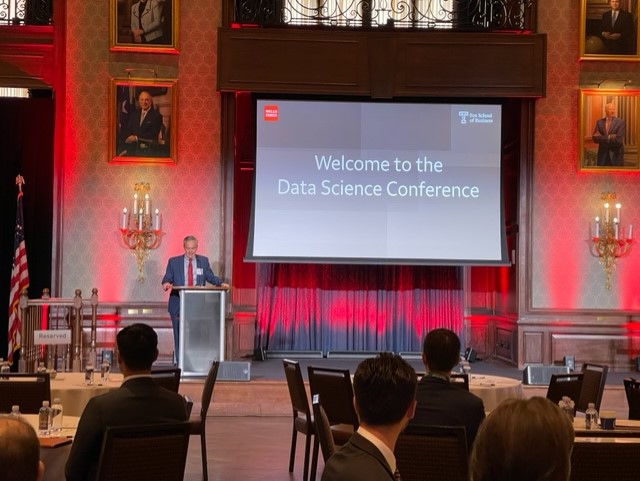The 2021 Data Science Conference brought together leading researchers and experts to explore technical aspects of statistical machine learning, artificial intelligence (AI) and deep learning that are relevant to data-driven investment methodologies.
The conference, held on Nov. 10, 2021 at the Union League of Philadelphia, was co-hosted by the Temple University’s Data Science Institute, housed in the Fox School of Business, and Wells Fargo Global Equity. The event offered an opportunity for academic researchers to discuss the real-life issues facing the industry and how data science can help solve problems.
In his opening remarks, Dean Ron Anderson stressed the need for learning data science and AI. “As we know, several major trends are happening across the business world right now. Our goal is for our research to reach beyond the academic world and impact the way managers think about their business and the ways they conduct business,” he said.
The conference featured panelists including Edoardo M. Airoldi and Donald B. Rubin of the Fox School, Natesh Pillai and Jun S. Liu of Harvard University, Edward I. George of the Wharton School of the University of Pennsylvania, Ruslan Salakhutdinov of Carnegie Mellon University, Panos Toulis from the University of Chicago Booth School of Business, Alan F. Karr of the Fraunhofer USA Center Mid-Atlantic and National Institute of Statistical Sciences, Alexander Volfovsky of Duke University and Hedibert Freitas Lopes of Arizona State University and INSPER.
Academics in attendance discussed their research in data science and finance, while also sharing ways to improve data science curricula within their schools, with a focus on producing graduates able to work successfully in the investment world.
For example, Natesh Pillai of Harvard spoke about the importance of recognizing potential data problems and how to avoid pitfalls in data analysis when delving into new data. “In statistics and business, we’re always very happy to get new data, but sometimes we rush headfirst into analysis,” he said. “Ignoring potential errors in data can lead to overconfidence or even incorrect conclusions.”

Introducing new developments in machine learning, Ed George of Wharton provided an overview of BART, a remarkably flexible Bayesian regression approach that can be used, for instance, to discover local trends buried in noisy multidimensional data.
Fox faculty members Rubin and Airoldi offered their insights into the differences between predictions based on correlations and black-box models versus those based on understanding (and quantification) of causal mechanisms, and the implications for their robustness and out-of-sample performance. Alan Karr, a regular visitor to the department, offered a complimentary, government- and humanistic-centric perspective emphasizing the need for transparency and interpretability.
John Leone, head of quantitative strategy at Wells Fargo, explains why it was so important to host an event that connects researchers and practitioners.
“Research performed by the academic community is of great interest to quantitative investors. The Data Science Conference connects the practitioner and academic communities and provides collaborative opportunities around the research presented.”
“The work most of these researchers are doing in data science is groundbreaking,” says Bora Ozkan, associate professor of finance at the Fox School and conference attendee. “It was wonderful to listen to their insights and gain a deeper understanding of how finance aligns with decision making and data.”
The conference, which was co-organized by Airoldi, director of Temple University’s Data Science Institute, together with Leone and colleagues at Wells Fargo Global Equity, exemplified two of the Fox School’s Strategic Plan pillars: Educational Innovation and Research Leadership. It progressed the school’s ability to use data and technology to improve curricula, while also providing a platform for faculty to translate their research into practical applications.

